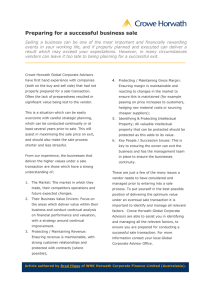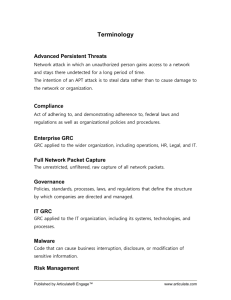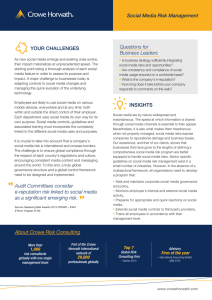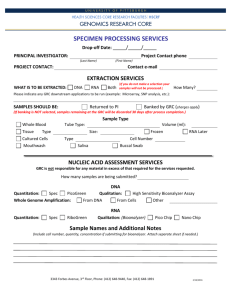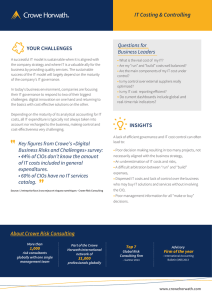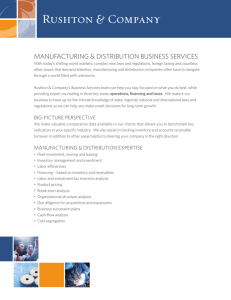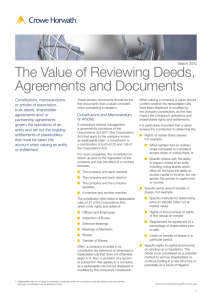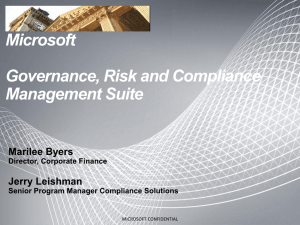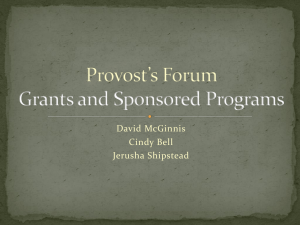Information Systems For Governance, Risk & Compliance YOUR CHALLENGES Questions for
advertisement
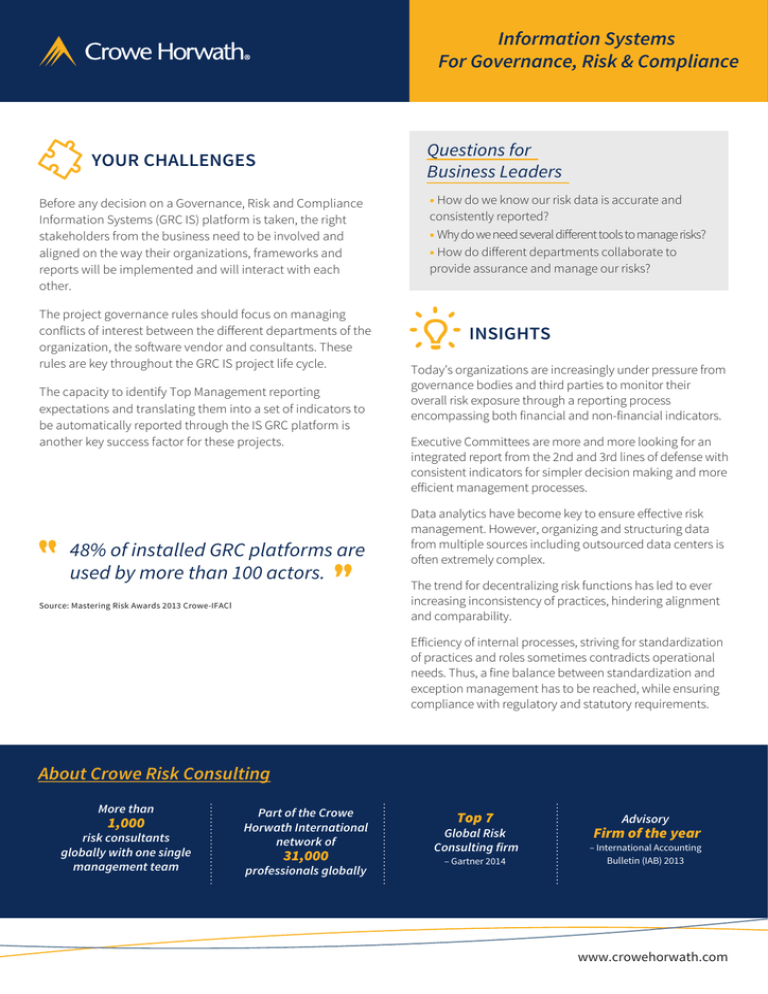
Information Systems For Governance, Risk & Compliance Questions for Business Leaders YOUR CHALLENGES Before any decision on a Governance, Risk and Compliance Information Systems (GRC IS) platform is taken, the right stakeholders from the business need to be involved and aligned on the way their organizations, frameworks and reports will be implemented and will interact with each other. The project governance rules should focus on managing conflicts of interest between the different departments of the organization, the software vendor and consultants. These rules are key throughout the GRC IS project life cycle. The capacity to identify Top Management reporting expectations and translating them into a set of indicators to be automatically reported through the IS GRC platform is another key success factor for these projects. 48% of installed GRC platforms are used by more than 100 actors. Source: Mastering Risk Awards 2013 Crowe-IFACI • How do we know our risk data is accurate and consistently reported? • Why do we need several different tools to manage risks? • How do different departments collaborate to provide assurance and manage our risks? INSIGHTS Today’s organizations are increasingly under pressure from governance bodies and third parties to monitor their overall risk exposure through a reporting process encompassing both financial and non-financial indicators. Executive Committees are more and more looking for an integrated report from the 2nd and 3rd lines of defense with consistent indicators for simpler decision making and more efficient management processes. Data analytics have become key to ensure effective risk management. However, organizing and structuring data from multiple sources including outsourced data centers is often extremely complex. The trend for decentralizing risk functions has led to ever increasing inconsistency of practices, hindering alignment and comparability. Efficiency of internal processes, striving for standardization of practices and roles sometimes contradicts operational needs. Thus, a fine balance between standardization and exception management has to be reached, while ensuring compliance with regulatory and statutory requirements. About Crowe Risk Consulting More than 1,000 risk consultants globally with one single management team Part of the Crowe Horwath International network of 31,000 professionals globally Top 7 Global Risk Consulting firm – Gartner 2014 Advisory Firm of the year – International Accounting Bulletin (IAB) 2013 www.crowehorwath.com Information Systems For Governance, Risk & Compliance HOW YOU BENEFIT WHAT WE BELIEVE Communicate vision All stakeholders should be familiar with the objectives and strategy related to the GRC IS project, the aim being to highlight tangible benefits and incorporate the views and expectations of both risk experts and their networks. The GRC IS project must be aligned with the enterprise overall vision for GRC. Involve experts Internal and external expertise are critical throughout the project and particularly for the modelling of the desired integration across the three lines of defense. Expertise is also important to prioritize business expectations and allocate required resources to each phase of the project. Collect market knowledge GRC vendors offer a vast range of solutions: from ready-to-use packages to fine-tuned integrated platforms, including mono-functionality tools. Leverage of GRC IS project experience is crucial to gaining valuable market knowledge of other organizations to select the most suitable GRC platform aligned with your vision. VISION FUNCTIONAL SCOPING Target model defini!on Gap analysis with current model GRC IS IMPLEMENTATION RFP & Selec!on Project governance Func!onal workshops Setup & Tests We help global organizations succeed at each phase of their GRC IS project: Vision • Aligning the GRC IS project’s vision with the broader GRC program • Developing a change enablement strategy to reinforce the commitment of key stakeholders to the project Functional scoping • Target model definition: GRC program modelling through formalizing user roles, information flows and integration points • Gap analysis: prioritizing actions, identifying required workload and resources for all project phases GRC IS implementation • Request For Proposal (RFP) & selection: target model formalization (RFP redaction) and decision-making support through vendor experience input • Project governance: alignment of stakeholders and vendor teams through efficient monitoring • Functional workshops: establishment of a unique language and a mutual understanding between internal stakeholders and software vendor teams • Setup & Tests: anticipating needs to ensure success of User Acceptance Tests • Roll-out: deployment with roll-out tools adapted to your organization’s culture and available resources • Change management: embedding the solution through robust training and organized communication Contact Information Roll-out Change Management GRC IS project’s life cycle GLOBAL CONTACT Jill Czerwinski jill.czerwinski@crowehorwath.com FRANCE CONTACTS Jérôme Soual Crowe Horwath LLP is an independent member of Crowe Horwath International, a Swiss verein. Each member firm of Crowe Horwath International is a separate and independent legal entity. Crowe Horwath LLP and its affiliates are not responsible or liable for any acts or omissions of Crowe Horwath International or any other member of Crowe Horwath International and specifically disclaim any and all responsibility or liability for acts or omissions of Crowe Horwath International or any other Crowe Horwath International member. Accountancy services in Kansas and North Carolina are rendered by Crowe Chizek LLP, which is not a member of Crowe Horwath International. © 2015 Crowe Horwath LLP jerome.soual@crowehorwath.com Gabriel Standley gabriel.standley@crowehorwath.com www.crowehorwathgrc.com www.crowehorwath.com
